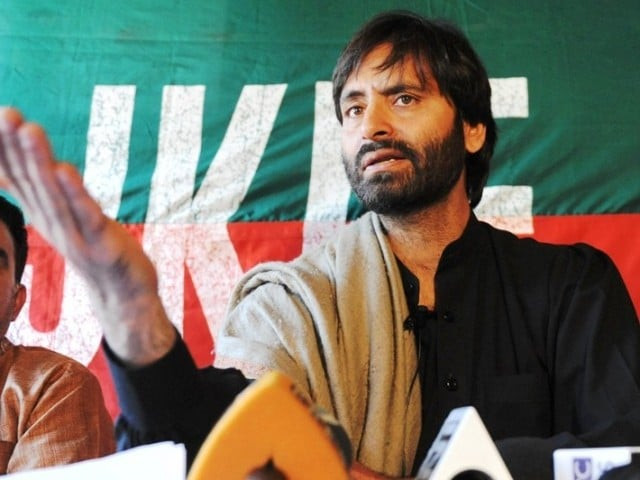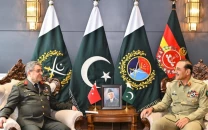OIC expresses concerns over life sentence to Yasin Malik
Muslim body urges world community to ensure legitimate struggle of Kashmiris must not be equated with terrorism

The Organisation of Islamic Cooperation (OIC) on Friday expressed its deep concern over the pronouncement of the life sentence to one of the most prominent Kashmiri leaders, Yasin Malik, who had been leading a peaceful freedom struggle for many decades.
Reiterating its solidarity with the people of Indian Occupied Jammu and Kashmir (IIOJK) in their struggle for their rights including their right to self-determination, the OIC General Secretariat urged the international community to ensure that the legitimate struggle of the Kashmiris for the realisation of their rights must not be equated with terrorism.
He also called on the government of India to release all Kashmiri leaders unfairly incarcerated, halt forthwith the gross and systematic persecution of Kashmiris in IIOJK; and respect the right of the people of the disputed valley to determine their own future through a free and impartial plebiscite as enshrined in the relevant United Nations Security Council resolutions.
The General Secretariat of the Organization of Islamic Cooperation (#OIC) expresses it deep concern over the pronouncement of life sentence for one of the most prominent #Kashmiri leaders, Mr. #YasinMalik, who has been leading a peaceful freedom struggle for many decades. pic.twitter.com/3cn9IcEqub
— OIC (@OIC_OCI) May 27, 2022
On Wednesday, an Indian court jailed Yasin Malik for life over several charges, including “terror funding”, triggering street protests outside his residence and condemnation from the Kashmiris diaspora worldwide.
Read more: Senate condemns Yasin Malik’s persecution
Last week, a special Indian court convicted the 56-year-old chairman of the Jammu and Kashmir Liberation Front (JKLF) on charges of “terrorism and funding acts of terror” after he “pleaded guilty” to all the 10 charges. However, he told the court on Wednesday that he had been practising non-violent politics after giving up arms in the 1990s.
The prosecutors had demanded of the court to award death penalty but Special Judge Parveen Singh instead sentenced him to life under a section of the Unlawful Activities Prevention Act. The court said that Malik “did not want any trial and therefore, he was ready to plead guilty”.
The trial court was designated for cases brought by the National Investigation Agency (NIA), India’s top anti-terrorism investigation body. The NIA had accused Malik of offences, including waging or attempting to wage war against India, and helping raise funds for anyone to “commit a terrorist act”.
Malik’s wife Mushaal Hussein Mullick said that the sentencing by a “kangaroo court” was illegitimate. “Verdict in minutes by Indian kangaroo court,” she wrote on Twitter. “The iconic leader will never surrender,” she added.
Court verdict in minutes by Indian kangaroo courts. Yasin Malik is the bravest man to challenge the Hitler Modi of this Era !!! We r all Yasin Malik #ReleaseYasinMalik Pray for the Lion of Kashmiris ! The iconic leader will never surrender pic.twitter.com/Hv9VJqMivQ
— Mushaal Hussein Mullick (@MushaalMullick) May 25, 2022
In Srinagar, the main city of IIOJK, authorities severed internet connections and police fired tear gas shells and pellets to disperse stone-pelting protesters outside Malik’s residence, who were shouting slogans demanding his freedom.
Local politicians in IIOJK said that the verdict was a setback to peace efforts. “We are afraid that this will further compound the uncertainties in the region and will only fuel more alienation and separatist feelings,” a group of parties said in a statement. Crowds also gathered in Azad Jammu and Kashmir (AJK) to call for Malik’s release.
#ReleaseYasinMalik @OIC_OCI @OIC_IPHRC @UNGeneva @UN @UN_HRC We demand unconditional release of my Husband the Peaceful Iconic Leader of Kashmir’s Freedom struggle & all Kashmiri political prisoners in Indian prisons! https://t.co/uxEqTtRNMB
— Mushaal Hussein Mullick (@MushaalMullick) May 27, 2022
Malik led hundreds of armed fighters until 1994 when he renounced violence to campaign peacefully for the liberation of Kashmir. He has since campaigned for Kashmir’s right to self-determination as chairman of the JKLF.
Malik has had talks several times with the Indian government, including with two previous prime ministers. Prime Minister Narendra Modi’s government had declared JKLF an “unlawful association” in 2019, the year when India split the IIOJK after abrogating the constitutional clauses that granted special status to the region.



















COMMENTS
Comments are moderated and generally will be posted if they are on-topic and not abusive.
For more information, please see our Comments FAQ